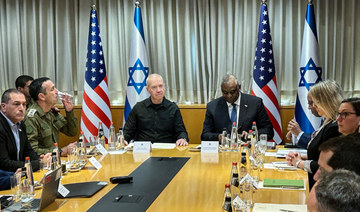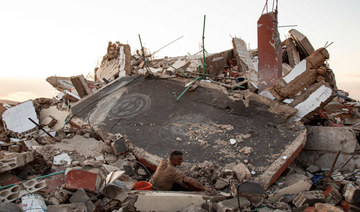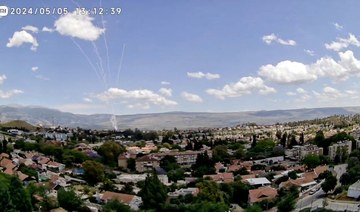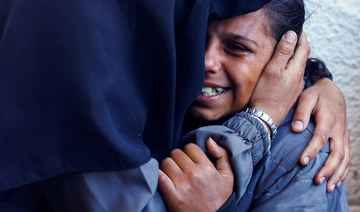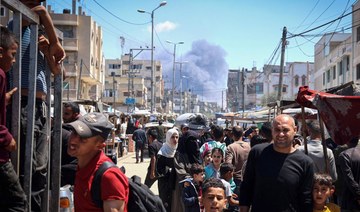TEL AVIV, Israel: The head of the CIA jetted to Europe for talks with Israeli and Qatari officials Monday, sounding out the potential for a deal on a new cease-fire and the release of hostages in Gaza, as the US defense secretary spoke to Israeli military leaders about scaling back major combat operations against Hamas.
Still, there was no sign that a shift in the war was imminent after more than two months of devastating bombardment and fighting. Fierce battles raged in northern Gaza, where residents said rescue workers were searching for the dead and the living under buildings flattened by Israeli strikes.
Pressure is growing, as France, the UK and Germany — some of Israel’s closest allies — joined global calls for a cease-fire over the weekend. Israeli protesters have demanded the government relaunch talks with Hamas on releasing more hostages after three were mistakenly killed by Israeli troops while waving a white flag.
US officials have repeatedly expressed concern about the large number of civilian deaths in Gaza. But after talks with Israeli officials Monday, US Defense Secretary Lloyd Austin said, “This is Israel’s operation. I’m not here to dictate timelines or terms.” The US has vetoed calls for a cease-fire at the UN and has rushed munitions to Israel.
The UN Security Council delayed a vote to Tuesday on an Arab-sponsored resolution calling for a halt to hostilities to allow unhindered access to humanitarian aid in order to try to avoid another veto by the United States. Diplomats said negotiations were taking place to get the US to abstain or vote “yes” on the resolution.
Prime Minister Benjamin Netanyahu has insisted that Israel will keep fighting until it ends Hamas rule in Gaza, crushes its formidable military capabilities and frees hostages still held in Gaza since the deadly Oct. 7 attack inside Israel that ignited the war. In the unprecedented attack, militants killed some 1,200 people, mostly civilians, and abducted around 240 men, women and children.
The war has killed more than 19,000 Palestinians and demolished much of the north into a moonscape. Some 1.9 million Palestinians — nearly 85 percent of Gaza’s population — have fled their homes, with most packing into UN-run shelters and tent camps in the southern part of the besieged territory.
HOSTAGE TALKS
In an apparent sign that talks on a hostage deal were growing more serious, CIA Director William Burns met in Warsaw with the head of Israel’s Mossad intelligence agency and the prime minister of Qatar, a US official said.
It was the first known meeting of the three since the end of a weeklong cease-fire in late November, during which some 100 hostages — including a number of foreign nationals — were freed in exchange for the release of around 240 Palestinian s held in Israeli prisons.
National Security Council spokesperson John Kirby said the talks were not “at a point where another deal is imminent. We are working literally every day on this.”
Aiming to increase public pressure on the Israeli government, Hamas released a video showing three elderly Israeli hostages, sitting in white T-shirts and pleading for Israel to bring their immediate release.
The comments were likely made under duress, but the video signaled Hamas wants to move on to discussions of releasing sick and elderly men in captivity. Israel has said it wants around 19 women and two children freed first. Hamas says the women include soldiers, for whom it is expected to demand a higher price in terms of prisoner releases.
Hamas and other militants are still holding an estimated 129 captives. Hamas has said no more hostages will be released until the war ends.
SCALING DOWN THE WAR
Austin, who arrived in Israel with Joint Chiefs Chairman Gen. CQ Brown, said he and Israeli officials exchanged “thoughts on how to transition from high intensity operations” and how to increase the flow of humanitarian aid to Gaza.
American officials have called for targeted operations aimed at killing Hamas leaders, destroying tunnels and rescuing hostages. Those calls came after US President Joe Biden warned last week that Israel is losing international support because of its “indiscriminate bombing.”
Speaking alongside Austin, Israeli Defense Minister Yoav Gallant said only that “the war will take time.” Last week, Gallant said Israel would continue major combat operations for several months.
Israeli military spokesman Daniel Hagari said the Israeli chief of staff met with Austin and Brown and presented “plans for the continuation of the battle in the coming stages.”
European countries appear to be losing patience. “Far too many civilians have been killed in Gaza,” EU foreign policy chief Josep Borrell posted on X. “Certainly, we are witnessing an appalling lack of distinction in Israel’s military operation in Gaza.”
Under US pressure, Israel provided more precise evacuation instructions earlier this month as troops moved into the southern city of Khan Younis. Still, casualties have continued to mount and Palestinians say nowhere in Gaza is safe as Israel carries out strikes in all parts of the territory.
Israel reopened its main cargo crossing with Gaza to allow more aid in — also after a request from the US But the amount is less than half of prewar imports, even as needs have soared and fighting hinders delivery in many areas. Israel blocked entry off all goods into Gaza soon after the war started and weeks later began allowing a small amount of aid in through Egypt.
Human Rights Watch on Monday accused Israel of deliberately starving Gaza’s population — which would be a war crime — pointing to statements by senior Israeli officials expressing the intent to deprive civilians of food, water and fuel or linking the entry of aid to the release of hostages.
UNPRECEDENTED DEATH AND DESTRUCTION
At least 110 people were killed in Israeli strikes Sunday on residential buildings in the urban Jabaliya refugee camp in northern Gaza, Munir Al-Boursh, a senior Health Ministry official, told Al Jazeera television.
Fierce fighting continued Monday in Jabaliya and the Gaza City districts of Zaytoun and Shijaiyah, where tens of thousands of Palestinians remain trapped, crowded in homes or schools.
In Jabaliya, first responders and residents searched the rubble of many collapsed buildings. “They use their hands and shovels,” said Amal Radwan, who is staying at a UN shelter there. “We need bulldozers and above all the bombing to stop.”
More than 19,400 Palestinians have been killed, according to the Health Ministry, which has said that most are women and minors and that thousands more are buried under rubble. The ministry does not differentiate between civilian and combatant deaths.
Israel’s military says 127 of its soldiers have been killed in the Gaza ground offensive. It says it has killed thousands of militants, without providing evidence.
Israel blames civilian deaths on Hamas, saying it uses them as human shields. But the military rarely comments on individual strikes.
REGIONAL TENSIONS
Yemen’s Houthi rebels continued attacks on shipping in the Red Sea in a campaign that has prompted a growing list of companies to halt their operations in the major trade route. The latest company was oil and natural gas giant BP, which said Monday it was suspending shipments through the Red Sea.
Austin said early Tuesday that the US, United Kingdom, Bahrain, Canada, France, Italy, Netherlands, Norway, Seychelles and Spain have created a new force to protect ships passing through the Red Sea. Some of the countries will conduct joint patrols while others will provide intelligence support in the southern Red Sea and the Gulf of Aden.
“This is an international challenge that demands collective action,” Austin said in statement released just after midnight in Bahrain.
Israel and Lebanon’s Hezbollah have traded fire along the border nearly every day since the war began. In the Israeli-occupied West Bank, over 300 Palestinians have been killed since the start of the war, including four overnight during an Israeli military raid in the Faraa refugee camp, according to the Palestinian Health Ministry.
This has been the deadliest year for Palestinians in the West Bank since 2005. Most have been killed during military raids, which often ignite gunbattles, or during violent demonstrations.
US envoys work for new hostage release deal, scale-down of Israel-Hamas war but say no timetable
https://arab.news/49wqx
US envoys work for new hostage release deal, scale-down of Israel-Hamas war but say no timetable
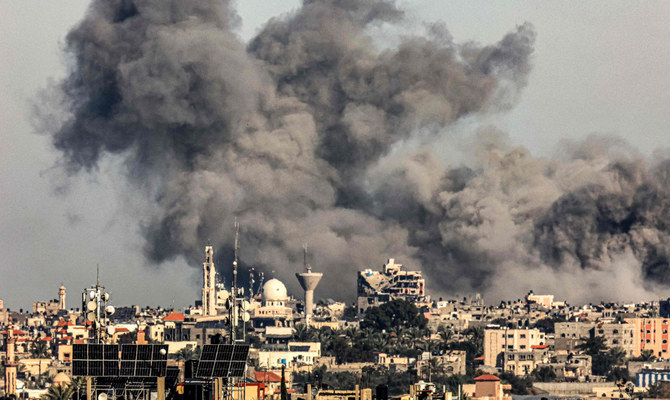
- There is no sign that a shift in the war is imminent after more than two months of devastating bombardment and fighting
Intense fire on Lebanon front leaves casualties on both sides
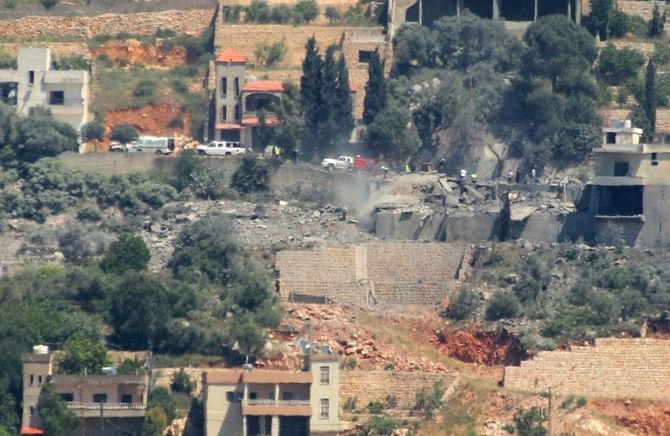
- Ten airstrikes hit the forest area stretching from the outskirts of Aita Al-Shaab to those of Ramyah within a few hours
- Hezbollah resorts to unconventional weaponry in response to Israel’s scorched-earth tactics
BEIRUT: The Israeli army launched more than 20 airstrikes on Lebanese border towns on Wednesday, resulting in deaths and injuries.
Alarms blared in the settlements of Adamit, Goren, Eilon, and Arab Al-Aramsheh in Western Galilee and Israeli media reported: “Hezbollah is leading a major attack from southern Lebanon using missiles and drones, and sirens are continuously sounding.”
Israeli news sites said: “Injuries occurred among the Israelis in the north due to missile strikes carried out by Hezbollah on Avivim, and the situation is difficult. Seven soldiers in the Al-Malikiyah site were hit, several killed and others injured, in a combined operation involving a missile salvo and suicide drone attacks. Hezbollah’s attacks also targeted the settlement of Kiryat Shmona.”
One outlet said a reservist soldier had been killed, while others reported power outages in Avivim and Dovev as a result of Hezbollah shelling.
Israeli army spokesman Avichay Adraee confirmed: “Airstrikes were launched at Hezbollah-affiliated targets in six areas in southern Lebanon, and Israeli warplanes raided the party’s military buildings in Kfarkela, Aita Al-Shaab, Khiam, and Maroun Al-Ras.”
Ten airstrikes hit the forest area stretching from the outskirts of Aita Al-Shaab to those of Ramyah within a few hours. The raids continued on the towns of Yaroun, Jabal Blat, Kfarkela, the outskirts of Rihan, Aaramta and Khiam.
One house in Khiam was completely destroyed. Paramedics working to remove the rubble found three Hezbollah members had been killed and another injured.
Aitaroun and Blida were hit with phosphorus bombs, which are banned internationally, while artillery shelling was recorded on the outskirts of the towns of Naqoura, Halta, Kfarchouba and Jabal Blat.
Civil defense teams in the Kfarkela-Tal Nahas area worked to extinguish a fire caused by one of the airstrikes.
According to a security source, the Israeli military utilized “GBU bunker-buster bombs in the airstrikes on Kafr Kila, renowned for their effectiveness in penetrating fortified structures. These bombs, part of Israel’s arsenal since 2000, were reportedly replenished through intensified American shipments.”
In retaliation, Hezbollah launched operations against Israeli military sites, some with guided missiles, causing deaths and injuries among Israeli soldiers. Hezbollah said this was in response to enemy attacks on southern villages and civilian homes.
A building used by Israeli soldiers in the Metula settlement was targeted, along with two structures in the Shlomi settlement, one in Hanita, two in Avivim, and a building at the Al-Manara site.
Later, Hezbollah targeted Israeli soldiers at the Raheb site, causing direct damage. A statement from the organization said it simultaneously targeted and destroyed espionage equipment at the same location.
The source highlighted a significant uptick in military engagement between the Israeli army and Hezbollah over the past 48 hours, coinciding with Israel’s incursion into and seizure of the Rafah crossing.
Media reports said: “Hezbollah has resorted to unconventional weaponry against Israeli sites in response to Israel’s scorched-earth tactics along the border, making the area inhospitable due to extensive phosphorus contamination. The cleanup process, aiming to rid the region of the pollutants used by the Israeli military to devastate crops, groundwater and soil, is anticipated to span several years.”
Israeli positions adjacent to the Blue Line unleashed heavy machine gun fire on the outskirts of Rmeich and Ramyah, targeting water tanks and vital roads connecting border communities.
Hezbollah has tied a ceasefire along the southern front to a cessation of hostilities in the Gaza Strip.
Al-Azhar, Arab Parliament condemn Israeli incursion into Rafah
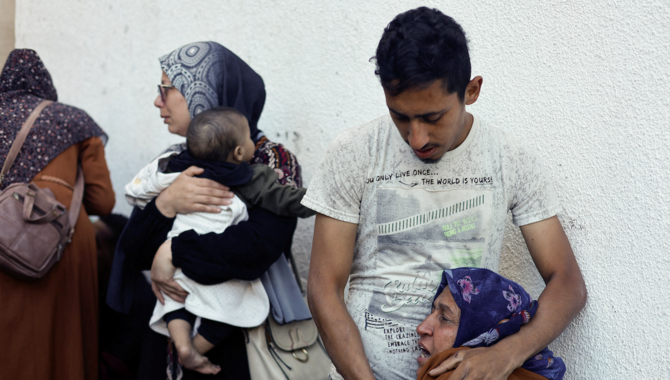
- Al-Azhar said the Israeli storming of the Rafah crossing was an attempt to invade the entire Palestinian city of Rafah and tighten the siege on the Gaza Strip
CAIRO: Al-Azhar Al-Sharif, Islam’s highest seat of learning, and the Arab Parliament have condemned in the strongest terms Israel’s actions in Rafah city in the Gaza Strip.
Israel on Tuesday sent tanks into Rafah in southern Gaza, seizing control of the border crossing with Egypt, an operation the UN said denied it access to the key humanitarian passage.
Al-Azhar said in a statement that the storming of the Rafah crossing by the tanks of the “terrorist Zionist entity” was an attempt to invade the entire Palestinian city of Rafah, tighten the siege on the Gaza Strip, and completely isolate it by shutting its last outlet to the outside world.
It called the Israeli action “a full-fledged war crime committed in full view of the entire world” and an addition to the series of “brutal crimes being committed by the occupying entity for more than 200 consecutive days.”
Al-Azhar said these “inhumane criminal attempts come within a series of recent escalations by the terrorist Zionist entity in the city of Rafah, which is the last refuge for Palestinian civilians.”
The institution said that this “portends the commission of new massacres and the fall of more innocent martyrs, in light of international silence and unprecedented impotence, which cannot be explained or justified.”
Al-Azhar said: “Our world is governed by a double standard and laws of the jungle, with the strong preying on the weak.”
It called on the international community, concerned international organizations, and all active parties to live up to their responsibilities in the face of the brutal massacres committed by the “Zionist entity” against Palestinians in Gaza, to intervene immediately to stop these “daily crimes” and to “make every effort to lift the siege on the strip completely and stop the Zionist plans.”
These plans, Al-Azhar said, aim at unscrupulously suffocating, starving and imprisoning 2 million innocent civilians, including women, children, the elderly, and the sick.
By capturing the Rafah crossing, Israel gained full control over the entry and exit of people and goods for the first time since it withdrew soldiers and settlers from Gaza in 2005, although it has long maintained a blockade of the coastal enclave in cooperation with Egypt.
The Arab Parliament, meanwhile, called Israel’s move “a dangerous escalation that undermines the efforts made to reach a ceasefire and spare the blood of Palestinian civilians who have been subjected to an unprecedented humanitarian catastrophe since the start of the brutal aggression against the Gaza Strip.”
It called the Israeli incursion “a death sentence for the wounded and sick in light of the collapse of the health system in the Gaza Strip.”
The Arab Parliament stressed that the developments taking place in the occupied Palestinian territories, including Rafah, and Israel’s intention to thwart efforts to reach a ceasefire are a clear embodiment of the “law of the jungle.”
It is, the organization said, a “blatant violation of all international norms, laws, and resolutions, which will lead the world into a dark tunnel and portend a new catastrophe that will end the remaining relief attempts and lead to complete genocide and forced displacement of millions of Palestinians.”
The Arab Parliament called on the international community, free countries, the UN Security Council, and the US administration to put more pressure than ever on the occupying entity to avoid further escalation and to force it to reach a sustainable truce and an immediate and permanent ceasefire.
The group praised the decision of the Bahamas to recognize the state of Palestine, stressing that it is “a new victory for the Palestinian cause and Palestinian diplomacy, especially since it comes at a time when the occupying entity’s plans to liquidate the Palestinian cause are exposed.”
South Gaza hospitals have only three days’ fuel left: WHO

- Despite international objections, Israel sent tanks into the overcrowded southern city of Rafah on Tuesday and seized the nearby crossing into Egypt
- “Hospitals in the south of Gaza only have three days of fuel left, which means services may soon come to a halt,” WHO chief said
GENEVA: Hospitals in the southern Gaza Strip have only three days of fuel left, the head of the World Health Organization said Wednesday, due to closed border crossings.
Despite international objections, Israel sent tanks into the overcrowded southern city of Rafah on Tuesday and seized the nearby crossing into Egypt that is the main conduit for aid into the besieged Palestinian territory.
“The closure of the border crossing continues to prevent the UN from bringing fuel. Without fuel all humanitarian operations will stop. Border closures are also impeding delivery of humanitarian aid into Gaza,” WHO Director General Tedros Adhanom Ghebreyesus said on X, formerly Twitter.
“Hospitals in the south of Gaza only have three days of fuel left, which means services may soon come to a halt.”
Tedros said Al-Najjar, one of the three hospitals in Rafah, was no longer functioning due to the ongoing hostilities in the vicinity and the military operation in Rafah.
“At a time when fragile humanitarian operations urgently require expansion, the Rafah military operation is further limiting our ability to reach thousands of people who have been living in dire conditions without adequate food, sanitation, health services and security,” he said.
“This must stop now.”
The Geneva-based WHO is the UN’s health agency.
Israel bombarded Rafah on Wednesday as talks resumed in Cairo aimed at agreeing the terms of a truce in the seven-month war.
Gaza’s bloodiest-ever war began following Hamas’s unprecedented October 7 attack on Israel that resulted in the deaths of more than 1,170 people, mostly civilians, according to an AFP tally of Israeli official figures.
Vowing to destroy Hamas, Israel has conducted a retaliatory offensive that has killed more than 34,800 people in Gaza, mostly women and children, according to the Hamas-run territory’s health ministry.
Egypt police probe murder of Israeli-Canadian businessman
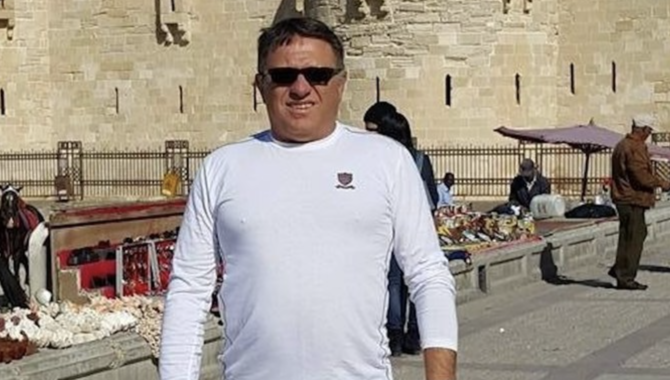
- Security sources made no link between the shooting and the dead man’s ethnic background
CAIRO: Egypt’s interior ministry said it had launched an investigation Wednesday after an Israeli-Canadian businessman was shot dead in the coastal city of Alexandria.
A police statement said the man, “a permanent resident of the country” was shot dead on Tuesday.
The Israeli foreign ministry said the murdered man was a businessman with dual Canadian-Israeli citizenship.
“He had a business in Egypt. The Israeli embassy in Cairo is in contact with the Egyptian authorities, who are investigating the circumstances of the case,” the ministry said.
Attacks on Israelis in Egypt are rare but not unprecedented.
On October 8, the day after Hamas attacked Israel triggering war in Gaza, an Egyptian policeman shot dead two Israeli tourists and their Egyptian guide.
Following their deaths, Israeli authorities advised its nationals in Egypt to leave “as soon as possible.”
Egypt was the first Arab country to sign a peace treaty with Israel but relations between the two peoples have never been warm.
The Egyptian government has often acted as mediator in flare-ups in the Israeli-Palestinian conflict that have threatened to stir up passions on the street.
Israel pounds Gaza as truce talks resume in Cairo
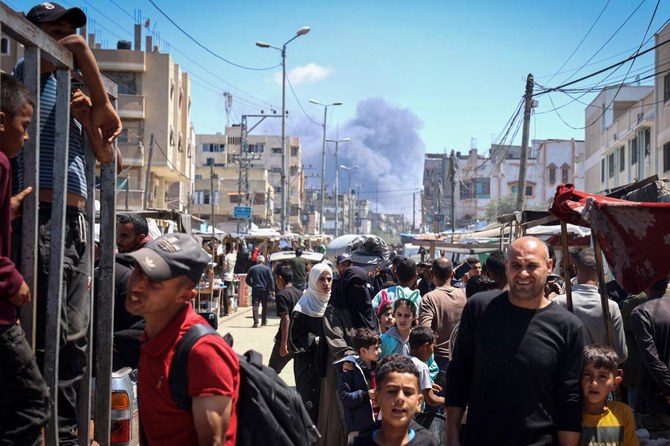
- AlQahera News: ‘Truce negotiations have resumed in Cairo today with all sides present’
- Moscow so far sees no prospect for a peace settlement in Gaza or the wider Middle East
RAFAH, Palestinian Territories: Israel bombarded the overcrowded Gaza city of Rafah, where it has launched a ground incursion, as talks resumed Wednesday in Cairo aimed at agreeing the terms of a truce in the seven-month war.
Despite international objections, Israel sent tanks into Rafah on Tuesday and seized the nearby crossing into Egypt that is the main conduit for aid into the besieged Palestinian territory.
The White House condemned the interruption to humanitarian deliveries, with a senior US official later revealing Washington had paused a shipment of bombs last week after Israel failed to address US concerns over its Rafah plans.
The Israeli military said hours later it was reopening another major aid crossing into Gaza, Kerem Shalom, as well as the Erez crossing.
But the UN agency for Palestinian refugees, UNRWA, said the Kerem Shalom crossing — which Israel shut after a rocket attack killed four soldiers on Sunday — remained closed.
It came after a night of heavy Israeli strikes and shelling across Gaza. AFPTV footage showed Palestinians scrambling in the dark to pull survivors, bloodied and caked in dust, out from under the rubble of a Rafah building.
Russia said on Wednesday that the war in Gaza was escalating due to Israel’s incursion into Rafah and that Moscow so far saw no prospect for a peace settlement in Gaza or the wider Middle East.
“An additional destabilizing factor, including for the entire region, was the launch of an Israeli military ground operation in Rafah,” Russian Foreign Ministry Spokeswoman Maria Zakharova told reporters.
“About one and a half million Palestinian civilians are concentrated there. In this regard, we demand strict compliance with the provisions of international humanitarian law.”
Speaking more broadly about efforts to find a lasting settlement in the Middle East, Zakharova said: “I would like to call it a settlement, but, alas, it is far from a settlement.”
“There are no prospects for resolving the situation in the Gaza Strip. On the contrary, the situation in the conflict zone is escalating daily.”
“We are living in Rafah in extreme fear and endless anxiety as the occupation army keeps firing artillery shells indiscriminately,” said Muhanad Ahmad Qishta, 29.
“Rafah is a witnessing a very large displacement, as places the Israeli army claims to be safe are also being bombed,” he said.
The Gaza war was sparked by Hamas’s unprecedented October 7 attack on Israel, which resulted in the deaths of more than 1,170 people, mostly civilians, according to an AFP tally of Israeli official figures.
Israel in response vowed to crush Hamas and launched a military offensive that has killed at least 34,789 people in Gaza, mostly women and children, according to the Hamas-run territory’s health ministry.
Militants also took around 250 people hostage, of whom Israel estimates 128 remain in Gaza, including 36 who are believed to be dead.
Talks aimed at agreeing a ceasefire resumed in Cairo on Wednesday “in the presence of all parties,” Egyptian media reported.
A senior Hamas official said the latest round of negotiations would be “decisive.”
“The resistance insists on the rightful demands of its people and will not give up any of our people’s rights,” he said on condition of anonymity because he was not authorized to speak publicly on the negotiations.
The official had previously warned it would be Israel’s “last chance” to free the scores of hostages still in militants’ hands.
Mediators have failed to broker a new truce since a week-long ceasefire in November saw 105 hostages freed, the Israelis among them in exchange for Palestinian prisoners held by Israel.



